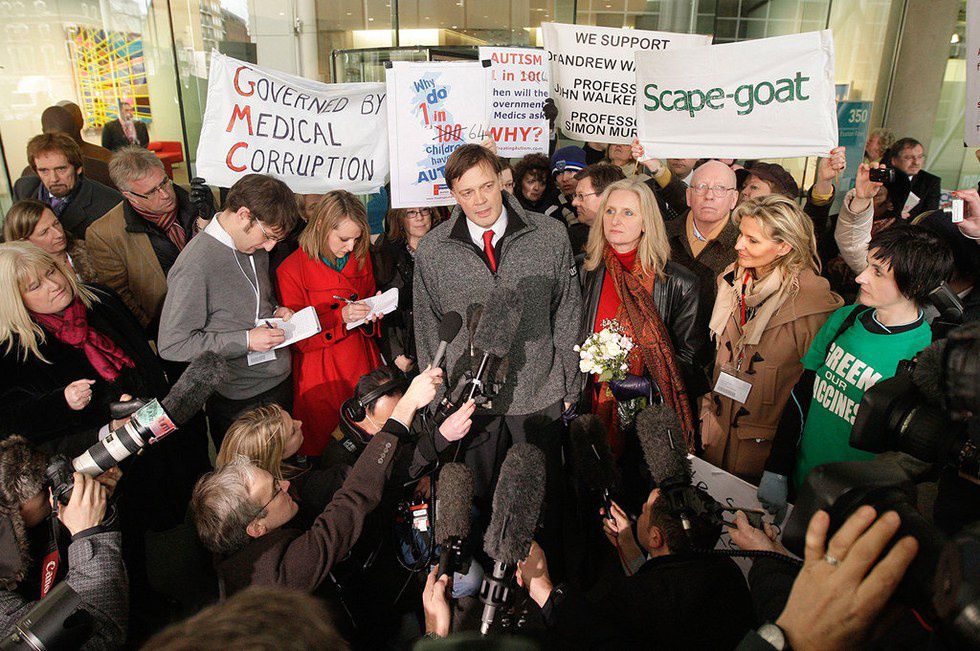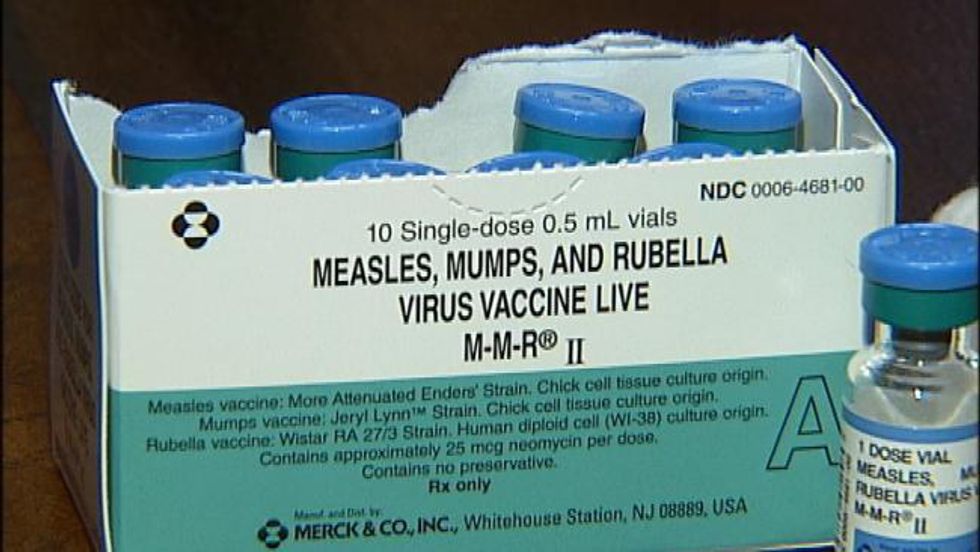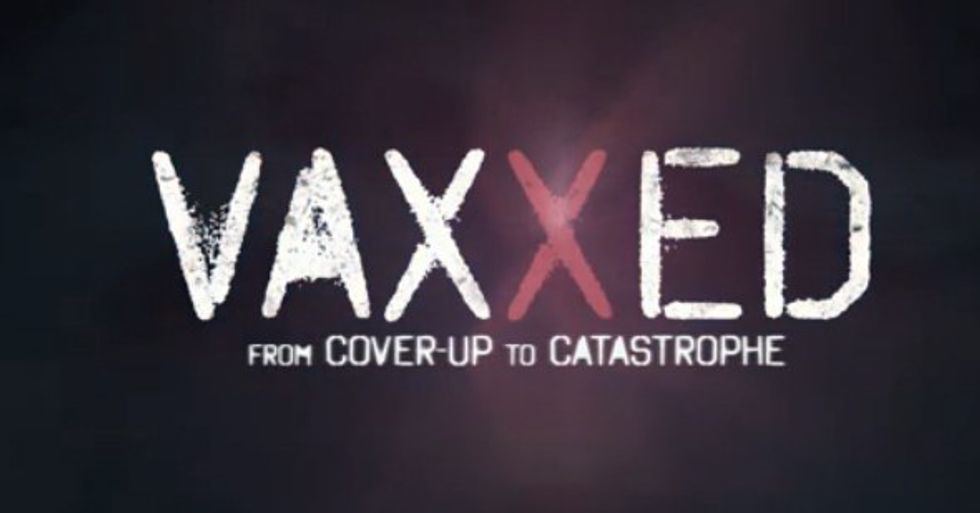I’m not a scientist, not by any stretch of the imagination. I prefer books to biology, poetry to the periodic table. I am however, a big believer in common sense and in doing your own research when it comes to major life decisions: political leanings, moral positions, career paths and medical choices.
It’s the last category that seems to be so contentious, and in one particular area: vaccinations. Unless you’ve been living under a rock, you’ve probably heard -- far more than once -- about the MMR-Autism controversy. Though is controversy the right word for something that’s been disproved by science multiple times? I’m not sure.
Here’s the gist of it: in 1998, British gastroenterologist and medical researcher Andrew Wakefield published a paper in a UK medical journal, The Lancet alleging that the MMR (measles, mumps, rubella) vaccine caused children to develop autism. (He also claimed that it could lead to bowel disease -- hence why a gastroenterologist was involved in the first place -- but let's focus on the far more loaded charge of autism.)
Wakefield’s study -- if we can call it that -- led to widespread panic from concerned parents, causing MMR vaccination rates to dip dramatically in the UK, US and Ireland. After the paper was published, Wakefield held a press conference where he called for a halt in MMR vaccinations in the UK until more research could be done on the adverse effects he believed the shots could cause.
It all sounded pretty scary, so it wasn’t surprising that those in the anti-vaccination camp embraced Wakefield’s study, with the founder of an anti-vaccination group calling Wakefield their “Nelson Mandela and Jesus Christ rolled into one,” which is a serious affront to Mandela, Christ, and decent people everywhere.
Because as soon as Wakefield’s purported study is looked into, it’s found to have not just one or two small problems, but serious issues relating to every single aspect of it. It’s a bit like thinking you’re flipping over a rock to see one or two small worms, only to do so and find out that the rock is more of a pebble compared to swarming mass of bugs not so well concealed underneath it.
To start with, Wakefield’s study had just 12 participants -- hardly a sample size large enough to be considered scientifically rigorous. Additionally, for studies to pass muster, participants must be selected blind: of course, if one is conducting a study based on a specific condition, the participants must have that condition, but they shouldn’t be selected based on criteria other than that. In Wakefield’s study however, his 12 participants were not random. In fact, many of them were litigants in a suit currently being prepared against vaccine manufacturers. The lawyers who were preparing the suit were from the Legal Aid Board, which provides legal assistance to UK citizens, and they paid Wakefield over fifty-five thousand pounds to conduct the study. Wakefield never disclosed this payment to editors at The Lancet, an act that should engender suspicion by its very absence.
But hold on to your hats, because we’re only just getting started. This wasn’t Wakefield’s first time accusing Big Pharma: in the early 90s, he claimed that the measles vaccine could cause Crohn’s Disease, despite all of the research completed that failed to confirm his hypothesis in any way. After this was struck down, Wakefield turned his attention to the supposed link between the MMR vaccine and autism, and he was put on the trail by -- and I’m not kidding -- Rosemary Kessick, the mother of a boy with autism and the founder of a group named Allergy Induced Autism. Hardly an impartial participant.
After the wave of fear from Wakefield’s paper peaked, journalists and scientists started to express a hefty amount of suspicion, with one investigative journalist, Brian Deer, digging into the study to discover its many, glaring problems. It was Deer who found the pending litigation suit and the payoff from the lawyers. But that’s not all he found. Deer also discovered that Wakefield manipulated and changed conflicting data in his study. For instance, three of the children in the study who were reported as having regressive autism were later found to have not been diagnosable with autism at all. Additionally, though the study claimed that all children had been perfectly normal prior to their MMR vaccination, five of the subjects were found to have had documented pre-existing conditions. Deer also found that Wakefield had, along with the father of one of the subjects, planned to develop and release what he called a “diagnostic kit,” essentially a single jab measles vaccination, and had even submitted a patent for the rival vaccine. Wakefield estimated that he could make about forty-three million pounds from the new test. Wakefield and his lawyers denied the charge.
Deer culled all of his research into a one hour program that aired on Channel Four, all about the hoax that Wakefield had perpetrated. After the report went public, Wakefield sued Deer, Channel Four, the production company Twenty/Twenty, which had helped produce the piece, and The Sunday Times. If he thought the ensuing case could help vindicate him, he was wrong. During two years of trial proceedings, he made no headway. In fact, it only served to further throw suspicion on him and his study. With the revelation that the fee Legal Aid lawyers had paid him was far more than first suspected -- actually more than four hundred thousand pounds, not just fifty-five thousand -- Wakefield bowed out of the suit and was forced to pay all of the defendants’ legal fees.
After the disastrous court case, the British General Medical Council convened a hearing to decide whether Wakefield was fit to continue practicing medicine in the UK. The proceedings revealed more ethical issues and medical fabrications, with one of Wakefield’s graduate students testifying that conflicting data was ignored or buried. The GMC also found that Wakefield ordered expensive, invasive and unnecessary tests like colonoscopies and lumbar punctures, without approval from the pediatric board and without indication from the patient’s medical histories that these procedures were necessary. Deer found that the tests were so painful for the children in the study that, on occasion, three nurses were recruited to hold patients down. The GMC also found, among many other issues with the study -- including conducting it on a basis not approved by the hospital’s ethics committee -- that Wakefield had paid children at his son’s birthday party for blood samples: five pounds each. After the proceedings came to a close, the GMC found Wakefield guilty of three dozen different charges, including four counts of dishonesty and twelve counts of abuse of developmentally challenged children. Wakefield was stripped of his license, and is barred from practicing medicine in the UK. Though he lives in the US currently, is not licensed to practice here at all.
So why am I bringing this all up, you wonder? The paper was published in ‘98, and has been disproved many times since. It’s all in the past, you may tell yourself: just some nutjob to add to history. But unfortunately, this is far from over. This past year, a “documentary” (and it’s in quotes because I’m not sure if you can rightly use that term for a film that’s more science fiction than fact) was produced called Vaxxed: From Cover-up to Controversy. Its trailer, which can be found on Youtube if you care to subject yourself to it, features a lot of home videos, testimonials from angry parents, and a former scientist for the CDC named William Thompson, who claims that Wakefield’s paper was right all along, but governments the world over have been engaged in a vast smear campaign/cover-up to make sure the truth never gets out. (Incidentally, we never see Thompson on camera: his role is relegated to several phone calls, which were recorded without his knowledge, and which many pointed out were clearly spliced together.) And remember Rosemary Kessick, founder of Allergy Induced Autism? She’s in Vaxxed as well: it seems that casting decisions were made based on Wakefield’s address book. Perhaps you’ll start to feel nervous at this point: science, by its very nature, is indefinite, and what if we’ve been harming our sweet little dears all this time? Not to worry: the film, which features Wakefield himself (describing him as a gastroenterologist no less, as he seems to have conveniently overlooked the fact that he’s been stripped of his license for the past six years) was produced by a company called Autism Media Channel. Nothing fishy there, except that Wakefield is the director of the organization. Oh, and he also wrote and directed the film. Though the trailer proudly declared it a Tribeca Film Festival pick, it was pulled from the festival shortly after it was picked, due to an avalanche of complaints, with many pointing out this was simply providing another platform from which Wakefield could disseminate false prophecies and specious science.
So Wakefield, it seems, isn’t going anywhere. And unfortunately, though he’s been exposed as a fraud more times than are trackable, his claims are still being used by parents who choose not to immunize. He’s as unshakable as The Protocols of the Elders of Zion: argue logic all you want, but truth doesn’t seem to matter to those who buy into his belief. Never mind that the paper was partially redacted by The Lancet in 2004, and fully redacted in 2010, with the editor-in-chief calling it “utterly false.” Never mind that ten of his twelve co-authors published a retraction of the study, also in 2004, or that one of them admitted, “I am certainly not aware of any convincing evidence for the hypothesis of a link between MMR and autism.” And never mind that his study has never been able to be replicated, which is an absolute must in the scientific method.
Since his paper was published, measles rates have spiked in the UK: there were fifty six total cases of measles in 1998, the year Wakefield’s paper was released. By 2006, there were four hundred and forty nine confirmed cases in the first five months of the year alone. Mumps outbreaks also rose dramatically, from almost zero cases in ‘98 to nearly five thousand in the first month of 2005 alone. As more parents chose not to vaccinate based on falsified evidence, herd immunity was badly compromised. Several of these patients sustained serious and permanent damage due to the disease, with others even dying. There have also been five major outbreaks since the paper was published, with the most serious one occurring in Italy, in which over five thousand people were hospitalized and the country spent an estimate of between seventeen and twenty two million euros to treat the epidemic. All this, from diseases we’ve known how to cure since the 60s.
All of this is to say one thing: when you look into Wakefield’s claims, after a Google search lasting a mere thirty seconds, it’s obvious that the study was a scientific, ethical, and financial travesty. All of this is public information, easily accessible to anyone who wishes to look into the study. And yet parents continue not to vaccinate, based on specious science from a conspiracy theorist who violated his Hippocratic oath many times over and seems to be living for the bottom line. In the process, they do great harm to their children, who will suffer untold pain and agony -- and perhaps permanent problems -- from diseases that, by rights, should be nearly gone.
Scientists and doctors have a responsibility to the layperson, yes: their job is to present us with information we can use to protect ourselves and those we care about. If something is harmful, tell us. If you’ve found a cure, make it accessible. But they aren’t the only ones who have a responsibility: parents have one as well, since they are making choices for others, and in the medical arena, they will often be holding their children’s lives in their hands. So if they choose to abdicate that responsibility, look the other way, fail to do their own research -- they are as irresponsible as Wakefield himself. Information is out there, and it’s easily obtained, if you would really like to find it, instead of existing merely in an echo chamber.
So stop pretending that vaccinations are forced on us by Big Pharm.; stop pretending that protecting your child from measles, mumps, or any other foul disease will cause them to become autistic; stop telling people that it’s poison. Look to facts and research and realize that we no longer have to worry about polio, smallpox, diphtheria: because doctors, who spent years training and whose work has been backed up by medical fact and the rigors of the scientific method, have found a cure.
The Unicef website lists seven major diseases, once strong enough to ravage the populace and whose very name brought fear into the hearts of those who heard it, that have been nearly eradicated by the discovery and proliferation of proper vaccinations. Though if Wakefield and those who follow his credo, worshipping him as some Christ-Mandela like savior, have anything to say about it, the list may shrink dramatically. After all, they’ve already targeted the last on Unicef’s list of diseases once thought near extinction: number seven is measles.
























